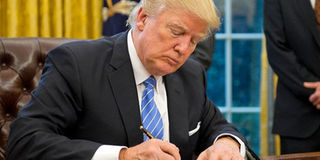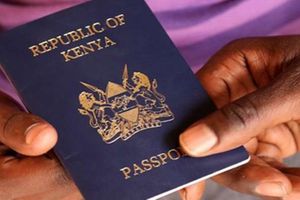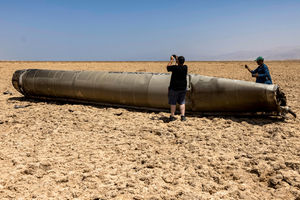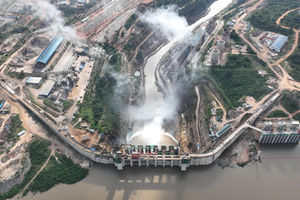President Trump is planning to sign executive orders on immigration this week

President Donald Trump
What you need to know:
The actions, part of a multi-day focus on immigration, are among an array of sweeping and immediate changes to the nation's immigration system under consideration by the new president. The moves represent Trump's first effort to deliver on perhaps the signature issue that drove his presidential campaign: his belief that illegal immigration is out of control and threatening the country's safety and security.
WASHINGTON - President Donald Trump plans to sign executive orders Wednesday enabling construction of his proposed wall on the U.S.-Mexico border and targeting cities where local leaders refuse to hand over illegal immigrants for deportation, according to White House officials familiar with the decisions.
The actions, part of a multi-day focus on immigration, are among an array of sweeping and immediate changes to the nation's immigration system under consideration by the new president. The moves represent Trump's first effort to deliver on perhaps the signature issue that drove his presidential campaign: his belief that illegal immigration is out of control and threatening the country's safety and security.
Trump's immigration blitz this week is widely seen inside the White House as a victory for the self-described populist wing of his inner circle - which includes chief strategist Stephen Bannon, attorney general nominee Jeff Sessions and top policy adviser Stephen Miller.
But discussions were ongoing Tuesday about just how far to go on some policies, in particular the Deferred Action for Childhood Arrivals program, known as DACA. The 2012 initiative has given temporary protection from deportation to hundreds of thousands of people who arrived in the United States as children. Trump vowed during the campaign to reverse it.
It was not yet clear late Tuesday whether DACA would be addressed as part of Trump's immigration actions, according to a White House official, because of differing views among Trump's advisers and associates about the timing, scope and political benefits of ending the program or suspending it for new entries.
"Many options are being worked through on DACA," the official said.
Officials are considering, but have not decided yet, whether to indefinitely shut down the program that allows refugees from war-torn Syria into the United States. Trump may also put the entire refugee program for all countries on hold for four months, according to an administration official familiar with the options under discussion.
This official said that Trump will also potentially bar for 30 days any travel to the United States from Iraq, Iran, Libya, Somalia, Sudan, Syria and Yemen - all Muslim-majority countries - until new visa procedures are developed. Residents from many of these places are already rarely granted U.S. visas. Trump may ask DHS and the director of National Intelligence to evaluate whether immigrants are being adequately screened for potential terrorist ties.
On Wednesday, Trump plans to speak to a town hall of employees at the Department of Homeland Security's headquarters in Washington, where he is expected to sign the orders relating to the wall and
"sanctuary cities." The effort to crack down on these localities will resonate with the Republican base, which has long criticized local officials who refuse to cooperate with federal immigration authorities.
Several people familiar with the discussions emphasized that the week's actions are intended to start fulfilling Trump's campaign promises on immigration and bring Republicans behind Trump on the issue, one day before he speaks at Thursday's congressional GOP retreat in Philadelphia. These people spoke on the condition of anonymity because the executive orders were still being finalized.
White House aides said Trump planned to meet Wednesday with several parents of children who were killed by immigrants who are in the country illegally. These activists, who refer to themselves as "angel moms," were frequently featured during Trump's campaign rallies and during the Republican National Convention.
Any immigration measures announced by the president will set up a fierce battle in Trump's first week between the White House and advocates for immigrants, who were reacting with alarm Tuesday as word spread that immigration was on the table.
The planned visit to DHS will be Trump's second to a Cabinet-level agency since he took office Friday. He spoke to employees at the CIA's headquarters in Northern Virginia on Saturday.
The presidential visit to DHS would symbolize some of the more controversial parts of Trump's agenda. He centered his campaign to some degree on his proposal to build a wall along the U.S.-Mexico border to keep out illegal immigrants, a plan that has been vehemently opposed by Democrats and immigrant advocates.
Trump's proposed wall is perhaps his most famous and disputed campaign proposal, and he feels so strongly about it that he told The Washington Post in an interview last year that building the structure "is easy. . . . It's not even a difficult project if you know what you're doing.''
Mexican President Enrique Peña Nieto will visit the U.S. next week to meet with Trump. The Mexican government has said that it would not pay for Trump's border wall despite Trump's insistence that the country would provide funding at a later date.
House Republicans have said they plan to fund the barrier, which some experts have estimated will cost more than $20 billion. But experts say the wall would face numerous obstacles, such as environmental and engineering problems and fights with ranchers and others who would resist giving up their land.
Trump has also promised to beef up immigration enforcement along the border and inside the United States - including a tripling of the number of U.S. Immigration and Customs Enforcement agents - in an expensive and logistically difficult operation to remove millions of people from the country.
Perhaps most in dispute were Trump's campaign comments on Muslims. He called at one point for a ban on all Muslims entering the United States as a counterterrorism measure and said he would halt immigration from Syria and deport Syrian refugees already in the country.
It is unclear how this week's executive actions, orchestrated from the White House, will sit with the man who would enforce them: Homeland Security Secretary John F. Kelly. Kelly, a retired Marine general who was confirmed Friday, struck a markedly different tone from the president during his confirmation hearing, saying the controversial southwest border wall might not "be built anytime soon.''
Kelly noted that when he was a Marine officer in Iraq, his forces secured stability in part by reaching out to clerics and other Muslim leaders. He vowed to promote "tolerance" and said he didn't think it was appropriate to target any group of people solely based on religion or ethnic background, including through the development of a registry.
DHS declined to comment on Tuesday. But people familiar with the matter said Kelly, known for his blunt manner, is already under intense pressure from the White House to enforce the immigration crackdown on which Trump built his campaign.




